| Listing 1 - 10 of 56 | << page >> |
Sort by
|
Book
ISBN: 9781108416337 9781108236324 9781108402842 Year: 2019 Publisher: Cambridge Cambridge University Press
Abstract | Keywords | Export | Availability | Bookmark
 Loading...
Loading...Choose an application
- Reference Manager
- EndNote
- RefWorks (Direct export to RefWorks)
In the fifth century BCE, Melissus of Samos developed wildly counterintuitive claims against plurality, change, and the reliability of the senses. This book provides a reconstruction of the preserved textual evidence for his philosophy, along with an interpretation of the form and content of each of his arguments. A close examination of his thought reveals an extraordinary clarity and unity in his method and gives us a unique perspective on how philosophy developed in the fifth century, and how Melissus came to be the most prominent representative of what we now call Eleaticism, the monistic philosophy inaugurated by Parmenides. The rich intellectual climate of Ionian enquiry in which Melissus worked is explored and brought to bear on central questions of the interpretation of his fragments. This volume will appeal to students and scholars of early Greek philosophy, and also those working on historical and medical texts.
Pre-Socratic philosophers --- Eleatics. --- Monism --- Aristotle. --- Melissus,
Book
ISBN: 9780300218800 030021880X 9780300246629 0300246625 0300225113 9780300225112 Year: 2017 Publisher: Yale University Press
Abstract | Keywords | Export | Availability | Bookmark
 Loading...
Loading...Choose an application
- Reference Manager
- EndNote
- RefWorks (Direct export to RefWorks)
A brilliant introduction to the philosophical concept of materialism and its relevance to contemporary science and culture. In this eye-opening, intellectually stimulating appreciation of a fascinating school of philosophy, Terry Eagleton makes a powerful argument that materialism is at the center of today's important scientific and cultural as well as philosophical debates. The author reveals entirely fresh ways of considering the values and beliefs of three very different materialists-Marx, Nietzsche, and Wittgenstein-drawing striking comparisons between their philosophies while reflecting on a wide array of topics, from ideology and history to language, ethics, and the aesthetic. Cogently demonstrating how it is our bodies and corporeal activity that make thought and consciousness possible, Eagleton's book is a valuable exposition on philosophic thought that strikes to the heart of how we think about ourselves and live in the world.
Materialism. --- Physicalism --- Animism --- Philosophy --- Positivism --- Dualism --- Idealism --- Mechanism (Philosophy) --- Monism --- Realism --- Materialism
Periodical
ISSN: 19446489 19307365
Abstract | Keywords | Export | Availability | Bookmark
 Loading...
Loading...Choose an application
- Reference Manager
- EndNote
- RefWorks (Direct export to RefWorks)
The Pluralist is dedicated to advancing the ends of philosophical thought and dialogue in all widely used philosophical methodologies, including non-Western methods and those of traditional cultures. The Pluralist upholds the Socratic dictum of self-knowledge and the love of wisdom as the purpose of philosophy. It seeks to express philosophical insights and concerns humanely and with an eye to literary as well as philosophical excellence, but technical papers are welcome. The Pluralist is a forum for discussion of diverse philosophical standpoints and pluralism's merits.
Pluralism --- Philosophy --- Pluralisme (Philosophie) --- Philosophie --- Philosophy. --- Pluralism. --- Monadology --- Monism --- Reality --- Mental philosophy --- Humanities
Book
ISBN: 1282496484 9786612496486 0742564584 9780742564589 9780742515062 0742515060 9780742515079 0742515079 9781282496484 6612496487 Year: 2009 Publisher: Lanham, Md. Rowman & Littlefield
Abstract | Keywords | Export | Availability | Bookmark
 Loading...
Loading...Choose an application
- Reference Manager
- EndNote
- RefWorks (Direct export to RefWorks)
Twentieth-Century Multiplicity explores the effect of the culture-wide sense that prevailing syntheses failed to account fully for the complexities of modern life. As Daniel H. Borus documents the belief that there were many truths, many beauties, and many values-a condition that the historian Henry Adams labeled multiplicity-rather than singular ones prompted new departures in a myriad of discourses and practices ranging from comic strips to politics to sociology.
Philosophy, American --- Pluralism. --- Monadology --- Monism --- Philosophy --- Reality --- United States --- Civilization --- Philosophy [American ] --- 20th century
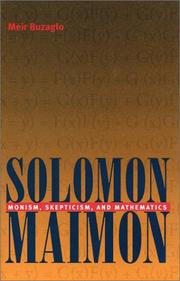
ISBN: 0822941767 9780822941767 Year: 2002 Publisher: Pittsburgh ; Pa. University of Pittsburgh Press
Abstract | Keywords | Export | Availability | Bookmark
 Loading...
Loading...Choose an application
- Reference Manager
- EndNote
- RefWorks (Direct export to RefWorks)
Philosophy, German --- Monism --- Skepticism --- Mathematics --- Philosophie allemande --- Monisme --- Scepticisme --- Mathématiques --- Maimon, Salomon, --- Maimon, Salomon --- Mathématiques --- Maimon, Solomon
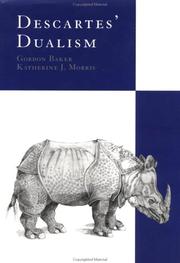
ISBN: 0415101212 9780415301046 0415301041 9780415101219 Year: 1996 Publisher: London Routledge
Abstract | Keywords | Export | Availability | Bookmark
 Loading...
Loading...Choose an application
- Reference Manager
- EndNote
- RefWorks (Direct export to RefWorks)
Dualism --- Dualisme --- History --- Descartes, René, --- Philosophy --- Idealism --- Materialism --- Monism --- Occasionalism --- Realism --- Descartes, René, --- Descartes, Renatus --- Cartesius, Renatus --- Descartes, René --- Dualism - History - 17th century --- Descartes, René, - 1596-1650
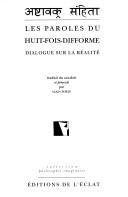
ISBN: 2841620093 9782841620098 Year: 1996 Volume: 28 Publisher: Paris Editions de l'éclat
Abstract | Keywords | Export | Availability | Bookmark
 Loading...
Loading...Choose an application
- Reference Manager
- EndNote
- RefWorks (Direct export to RefWorks)
Les Paroles du Huit-fois-difforme (Ashtâvakra Samhitâ) est un texte classique du monisme védantique, postérieur de plusieurs siècles au Mahâbhârata dans lequel ses protagonistes sont mentionnés pour la première fois. Sa rédaction peut être datée entre le ive et le viie siècle de notre ère. Il consigne l’instruction spirituelle du roi Janaka par l’enfant Huit-fois-difforme Ashtâvakra. «Comment s’obtient la connaissance ? Comment se produira la délivrance ? Et l’absence de toute passion, comment s’obtient-elle ? » Tous les concepts fondamentaux de notre philosophie sont évoqués ici : l’Être, la connaissance, l’Un, le multiple, la conscience, la pensée, la vérité, etc. Mais le bouleversement advient dès lors qu’on réalise qu’en sanskrit la pensée est un organe, l’intellect un sens qui transcrit les cinq autres, et que la vérité s’apparente à ce qui peut être « désigné du doigt ». Il en va de même pour tous nos concepts qui semblent si lisses à la lecture qu’ils glissent entre nos mains, animés qu’ils sont d’une vie débordant nos limites occidentales.« Langue rigoureuse et puissante que l’on saisit par ses racines et que l’on pénètre par ses feuillages, le sanskrit est à la conscience ce que l’Arbre inversé est au cosmos. » Alors la lecture des Paroles du Huit-fois-difforme devient une expérience de haute-montagne. Une lente ascension d’un monde et d’une langue, d’un monde qui est la langue, jusqu’au principe des choses, jusqu’à ce que « le sage soit comme le ciel». « À quoi bon multiplier les mots ? » s’écrie alors Ashtâvakra, et cette « paideia du silence » adressée au roi Janaka prend une tout autre dimension pour l’homme occidental, coupé de son « orient » où naît le jour, pour qui les mots sont « ce qui reste de tant d’espoir».
Monism --- Vedanta --- Hindu philosophy --- Monisme --- Philosophie hindoue --- Early works to 1800 --- Sacred books --- Ouvrages avant 1800 --- Livres sacrés --- Livres sacrés
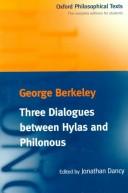
ISBN: 0198751494 Year: 1998 Volume: *4 Publisher: Oxford New York Oxford University Press
Abstract | Keywords | Export | Availability | Bookmark
 Loading...
Loading...Choose an application
- Reference Manager
- EndNote
- RefWorks (Direct export to RefWorks)
Ame --- Idealism --- Idealisme --- Idéalisme --- Soul --- Ziel --- Animism --- Monism --- Personalism --- Philosophy --- Positivism --- Dualism --- Materialism --- Realism --- Transcendentalism --- Pneuma --- Future life --- Philosophical anthropology --- Theological anthropology --- Spirit
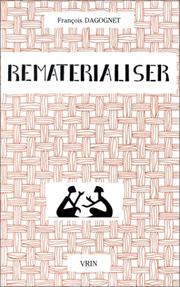
ISBN: 2711608859 9782711608850 Year: 1985 Publisher: Paris Vrin
Abstract | Keywords | Export | Availability | Bookmark
 Loading...
Loading...Choose an application
- Reference Manager
- EndNote
- RefWorks (Direct export to RefWorks)
Materialism --- Technology --- Materials --- Art --- Matérialisme --- Technologie --- Matériaux --- Philosophy --- Philosophie --- Materialism. --- Matérialisme --- Matériaux --- Matière --- Materie. --- Physicalism --- Animism --- Positivism --- Dualism --- Idealism --- Mechanism (Philosophy) --- Monism --- Realism
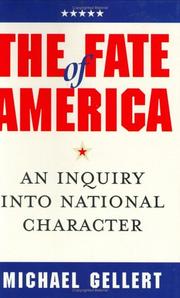
ISBN: 1612342213 9781612342214 1574883569 9781574883565 1574884719 9781574884715 Year: 2002 Publisher: Washington, D.C. Potomac Books, Inc.
Abstract | Keywords | Export | Availability | Bookmark
 Loading...
Loading...Choose an application
- Reference Manager
- EndNote
- RefWorks (Direct export to RefWorks)
The Fate of America examines the national character of the United States against the backdrop of its history, popular culture, and media. Michael Gellert suggests that the deterioration of America's "heroic ideal," the heart of its national character, is responsible for the country's deepening social ills and the erosion of its vital institutions. He calls for a spiritual and intellectual renaissance and a renewed sense of national purpose in order to meet the challenges of the twenty-first century.
Comparative civilization. --- Idealism --- Animism --- Monism --- Personalism --- Philosophy --- Positivism --- Dualism --- Materialism --- Realism --- Transcendentalism --- Civilization, Comparative --- Civilization --- Social aspects --- National characteristics [American ] --- Comparative civilization --- United States --- Heroes --- Mythology
| Listing 1 - 10 of 56 | << page >> |
Sort by
|

 Search
Search Feedback
Feedback About UniCat
About UniCat  Help
Help News
News